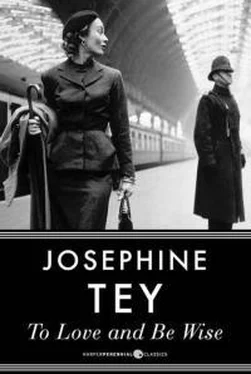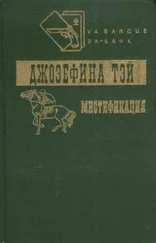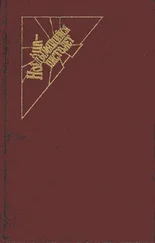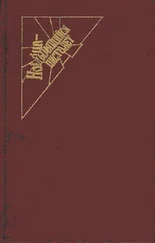‘I wish I wasn’t going home to a roof,’ Liz said into the silence. ‘It’s a night for the prehistoric.’
But she went away down the rutted track to the road, her headlights making metallic green stains on the dark grass, and left them to the silence and the prehistoric.
After that the two explorers became mere voices on the telephone.
Each evening they rang up Trimmings from some pub or call box to report progress. They had walked successfully down to Otley and found their canoes waiting for them. They took to the river and were delighted with their craft. Walter’s first notebook was already full, and Searle was lyrical on the beauty of this England in its first light powdering of blossom. From Capel he called specially for Lavinia to tell her that she had been right about the magic; England did really have the original blueprint.
‘They sound very happy,’ Lavinia said in a half-doubtful, half-relieved way as she hung up. She longed to go and see them, but the compact was that they were to be as strangers in a strange land, passing down the river and through Salcott St. Mary as though they had never seen it before.
‘You spoil my perspective if you bring Trimmings into it,’ Walter had said. ‘I must see it as if I had never seen it before; the countryside, I mean; see it fresh and new.’
So Trimmings waited each night for their telephoned report; mildly amused at this make-believe gulf.
And then on Wednesday evening, five days after they had set out, they walked into the Swan and were hailed as the Stanleys of the Rushmere and treated to drinks by all and sundry. They were tied up at Pett’s Hatch, they said, and were sleeping there; but they had not been able to resist walking across the fields to Salcott. By water it was two miles downriver from Pett’s Hatch to Salcott, but thanks to the loop of the Rushmere it was only a mile over the fields from one to the other. There was no inn at Pett’s Hatch, so they had walked by the field-path to Salcott and the familiar haven of the Swan.
Talk was general at first as each newcomer inquired as to how they did. But presently Walter took his beer to his favourite table in the corner, and after a little Searle followed him. Several times from then on one or other of the loungers at the bar made a movement towards the two to engage them once more in conversation, only to pause and change his mind as something in the attitude of the two men to each other struck him as odd. They were not quarrelling; it was just that something personal and urgent in their intercourse kept the others, almost unconsciously, from joining them.
And then, quite suddenly, Walter was gone.
He went without noise and without a goodnight. Only the bang of the door called their attention to his exit. It was an eloquent slam, furious and final; a very pointed exit.
They looked in a puzzled fashion from the door to the unfinished beer at Walter’s empty place, and decided in spite of that angry sound that Walter was coming back. Searle was sitting at his ease, relaxed against the wall, smiling faintly; and Bill Maddox, encouraged by the easing of that secret tension that had hung like a cloud in the corner, moved over and joined him. They talked outboard-motors and debated clinker versus carvel until their mugs were empty. As Maddox got up to refill them he caught sight of the flat liquid in Walter’s mug and said: ‘I’d better get another for Mr. Whitmore; that stuff’s stale.’
‘Oh, Walter has gone to bed,’ Searle said.
‘But it’s only–’ Maddox was beginning, and realized that he was about to be tactless.
‘Yes, I know; but he thought it would be safer.’
‘Is he sickening for something?’
‘No, but if he stayed any longer he was liable to throttle me,’ Searle said amiably. ‘And at the school Walter went to they take a poor view of throttling. He is putting temptation behind him. Literally.’
‘You been annoying poor Mr. Whitmore?’ said Bill, who felt that he knew this young American much better than he knew Walter Whitmore.
‘Horribly,’ Searle said lightly, matching a smile with Bill’s.
Maddox clicked his tongue and went away to get the beer.
After that, conversation became general. Searle stayed until closing time, said goodnight to Reeve, the landlord, as he locked the door behind them, and walked down the village street with the others. At the narrow lane that led between the houses to the fields he turned off, pelted by their mock-condolences on his lack of a snug bed, and throwing back in his turn accusations of frowst and ageing arteries.
‘Goodnight!’ he called, from far down the lane.
And that was the last that anyone in Salcott St. Mary ever saw of Leslie Searle.
Forty-eight hours later Alan Grant stepped back into the affairs of the Trimmings household.
Grant had just come back from Hampshire, where a case had ended unhappily in suicide, and his mind was still reviewing the thing, wondering how he might have managed things differently to a different end; so that he listened with only an ear-and-a-half to what his superior was saying to him until a familiar name caught his whole attention.
‘Salcott St. Mary!’ said Grant.
‘Why?’ said Bryce, stopping his account. ‘Do you know the place?’
‘I’ve never been there, but I know of it, of course.’
‘Why of course?’
‘It’s a sort of artistic thieves’ kitchen. There’s been a migration of intelligentsia to the place. Silas Weekley lives there, and Marta Hallard, and Lavinia Fitch. Tullis has a house there too. It isn’t Toby Tullis who is missing, by any chance?’ he asked hopefully.
‘No, unfortunately. It’s a chap called Searle. Leslie Searle. A young American, it seems.’
For a moment Grant was back in the crowded doorway of Cormac Ross’s room, listening to a voice saying: ‘I’ve forgotten my megaphone.’ So the beautiful young man had disappeared.
‘Orfordshire say they want to put it in our laps not because they think the problem is insoluble but because it’s a kid-glove affair. They think it would be easier for us than for them to pursue inquiries among the local bigwigs, and if there is any arresting to be done they would rather that we did it.’
‘Arresting? Are they suggesting that it was murder?’
‘They have a strong leaning to that theory, I understand. But, as the local inspector said to me, it sounds so absurd when you say it aloud that they shrink from uttering the name, even.’
‘What name?’
‘Walter Whitmore.’
‘ Walter Whitmore !’ Grant let out his breath in a soundless whistle. ‘I don’t wonder they don’t like saying it aloud. Walter Whitmore! What is he supposed to have done to Searle?’
‘They don’t know. All they’ve got is some suggestion of a quarrel before the disappearance. It seems that Walter Whitmore and Searle were travelling down the Rushmere in canoes, and–’
‘Canoes?’
‘Yes, a kind of stunt. Whitmore was going to write about it and this chap Searle was going to supply the illustrations.’
‘Is he an artist, then?’
‘No. A photographer. They camped out each night, and on Wednesday night they were sleeping on the river bank about a mile from Salcott. They both came to the pub at Salcott for a drink that evening. Whitmore left early – in some sort of pet, it is alleged. Searle stayed till closing time and was seen to start off down the track to the river. After that he was not seen by anyone.’
‘Who reported the disappearance?’
‘Whitmore did next morning. When he woke and found that Searle had not occupied his sleeping bag.’
‘He didn’t see Searle at all on Wednesday night after leaving the pub?’
Читать дальше











